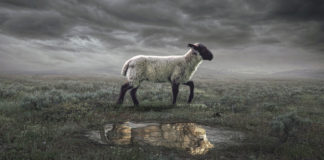Is Christianity a cult?
Western society has a fascination with cults. The word itself conjures up imagery of a seedy leader sporting dark aviator sunglasses and captivating a group of conservatively dressed people with his every syllable. The word brings a subtext of utter devotion but also absolute brainwashing or mind control.
The (un)expected Messiah
“God's viewpoint is sometimes different from ours—so different that we could not even guess at it unless He had given us a Book which tells us such things.”[1](Corrie ten Boom)
In the footsteps of the historical Jesus: benefits and perils
Christianity is either historical or not. It claims that “God acted decisively in history, revealing Himself in external, specific events attested in the Scriptures of the Old and New Testaments.”[1] The most important of these events was the coming of Jesus as the Messiah, the saving Christ.
The imperatives of absence
Contrary to one's initial impression, vigilance is not the main theme of Jesus' parables of "absence and expectation." Absence is central to these stories, because it is absence which enriches them, rather than impoverishing them. Absence is not a shortage, a gap, or a sign of non-existence—it is a catalyst.
Self-help and spiritual paralysis
Why personalising Christianity could threaten your salvation.
Rich man, poor man: The exam right outside your door
There was a rich man who was dressed in purple and fine linen and lived in luxury every day. At his gate was laid a beggar named Lazarus, covered with sores and longing to eat what fell from the rich man’s table. Even the dogs came and licked his sores.
Good reasons to read the whole Bible
As intimidating as the Bible may sometimes be, especially because of its size and its sometimes difficult passages, many who have read it from cover to cover say that it has changed their lives for the better—the spiritual resources the whole Bible can provide are not found elsewhere.
Injustice and God: Is He the wrongdoer or the one wronged?
The concept of reward is one that encapsulates a world of joys, satisfactions, pleasant emotions, and accomplishments. It is usually correlated with what we do, what we say, who we are, and so on. We could say that it is an expression of our value in relation to the world. But any reward can be overshadowed by painful feelings when there is a...
Why do bad things happen to good people?
The question in the title is a protest which expresses a fair amount of suspicion towards God. It is a barely concealed condemnation of God and His actions, the strange rebellion of a world that sees itself as morally superior to God. People forget Scripture's words in the book of Job: Beware lest wrath entice you into scoffing (Job 36:18, RSV).
What the Bible says about the flat Earth theory
Against the background of declining confidence in the elites—be they political, religious or scientific—flat Earth theory has lately been revived and promoted by a wave of fake news and misinformation that circulates on social media. In this article we will analyse the connection between the Bible and the flat Earth theory.
The hour of His judgment
The judgment of God is the greatest demonstration of His justice in the universe—the other side of the coin bearing the image of the Cross. In God, love and faithfulness meet together; righteousness and peace kiss each other (Psalm 85:10).
Joseph of Nazareth: The virgin’s husband and the Son’s father
He married a pregnant woman and accepted the responsibility of raising and educating a Son who was, because of His divine power, his Father. This was a mission full of risks and challenges for a humble carpenter from Nazareth, who has come to attract the attention and respect of generations.
Born of a virgin
When Larry King was asked who he would most like to interview among all the famous characters of history, his answer was clear: "Jesus Christ". The talk show host wanted to know if Christ had indeed been born of a virgin. "The answer to that question would define history for me,"[1] King said.
How can I become authentic?
"Suppose I go to the Israelites…and they ask me, ‘What is his name?' Then what shall I tell them? God said to Moses, 'I AM who I AM. This is what you are to say to the Israelites: I AM has sent me to you'" (Exodus 3:13-14).
Reasons for the cross of Christ: why was His sacrifice needed?
The name of Jesus brings to mind the gift of the incarnate Godhead—their supernatural acts, astonishing wisdom, incomparable goodness, unmitigated innocence, supreme sacrifice, offered salvation, and our only certain hope.


























